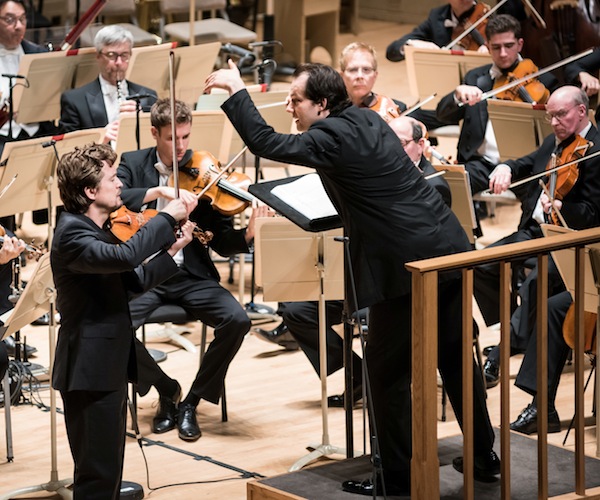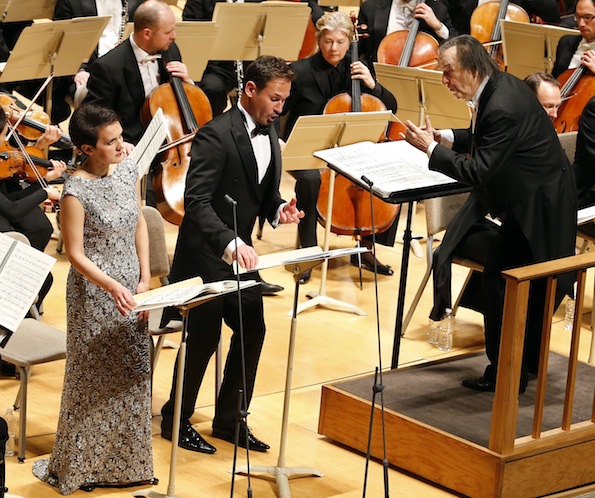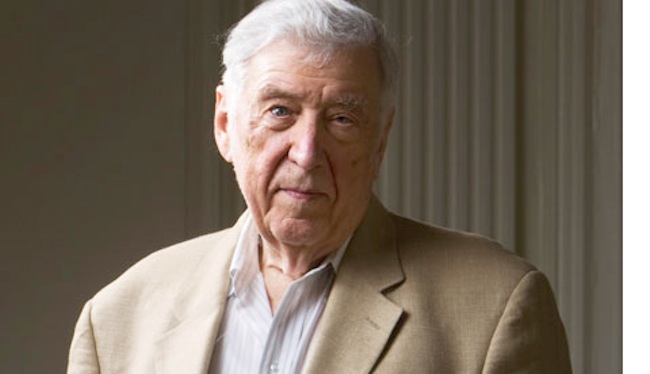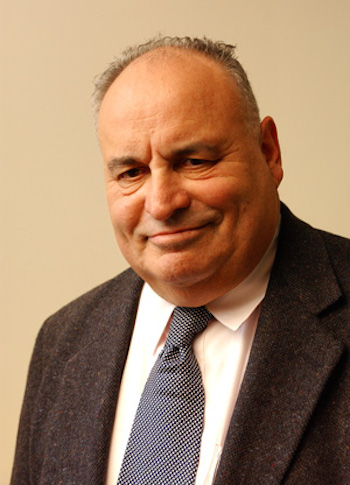Music Feature: Best Classical Performances of 2015
Of course, it’s a tricky business to summarize a classical music scene as busy and wide as Boston’s.
By Jonathan Blumhofer
Looking back, the current year has proven to be remarkably bountiful one, locally, for classical music. Operatic productions – from professional companies to conservatories – are flourishing, and not just with revivals of La Bohème and Carmen. The last twelve months have included the world premiere of Matthew Aucoin’s The Crossing; the local premiere of Leos Janacek’s Katya Kabanova; and performances of an array of lesser-known stage works by Karol Szymanowski, William Walton, Arthur Sullivan, Phillip Glass, and Jules Massenet (to name a few). On the orchestral front, the city’s half-dozen or so major ensembles managed a number of impressive programs and concerts. Twenty-fifteen was a year of significant milestones for two of them: the Handel & Haydn Society celebrated its bicentennial while the peerless Boston Modern Orchestra Project (BMOP) turned twenty. At the Boston Symphony (BSO), Andris Nelsons has proven not only a big box office draw but, increasingly, a perceptive programmer and a quickly-maturing conductor. And Boston’s seemingly-endless chamber music scene continues to bustle as furiously as ever.
Of course, it’s a tricky business to summarize a classical music scene as busy and wide as Boston’s. I’m well aware that I haven’t heard everything that’s been performed. And, as far as concerts go, the focus of my listening has mostly been orchestral and operatic performances, leaving much of the region’s extremely rich chamber and early music offerings to other ears. So this list is necessarily (and consciously) not comprehensive. Still, it’s fun to recall what’s been played locally since January and be reminded just how fortunate we are to have the musicians and ensembles in town that we do. So, without further ado, below are my selections for top live classical performances of 2015. Feel free to disagree, add to them, come up with your own list, etc. Above all, enjoy!
*****

Christian Tetzlaff with the BSO and music director Andris Nelsons. Photo: Liza Voll.
Performance of the Year: Christian Tetzlaff playing Beethoven’s Violin Concerto
There were not a few worthy performances from which to choose, but Tetzlaff’s mesmeric account of Beethoven’s well-worn Violin Concerto with Andris Nelsons and the Boston Symphony Orchestra (BSO), its every phrase seemingly taken apart and held up for inspection under a microscope, stands above them all, as riveting in my mind now as when I heard it back in April. Sure, it wasn’t kosher – Tetzlaff drew out the line here, tugged at it there; his dynamic range exceeded Beethoven’s markings; and he played his own first-movement cadenza which, like Schnittke’s, incorporates the timpani – and, especially at intermission, it seemed to have perplexed not a few. But the end result was captivating: a complete rethinking and reconsideration of music I thought I knew as well as anything. It was unsettling and, in its way, provocative, reminding just how vital live performance can be and how important it is to push against blind, accepting complacency (whether in art or elsewhere).
Best staged performance: Thomas Adès’ Powder Her Face (Odyssey Opera)
Opera in Boston has rarely been (or at least appeared to be) in a healthier state, at least from a creative standpoint, and that’s thanks, in part, to Odyssey Opera. The plucky company’s second summer festival celebrated operas from Britain and culminated in Thomas Adès’ darkly satiric, ultimately tragic, Powder Her Face. It’s rightly notorious for its salacious bits, but Odyssey’s production, with Patricia Schuman as the voracious Duchess, was remarkably human and vulnerable, even if one didn’t exactly leave with feelings of sympathy for its main characters. The singing and acting of the cast were spot-on, Nic Muni’s sets were direct and uncluttered, and the fourteen-piece orchestra, led by Gil Rose, the model of precision, color, and feeling. These performances weren’t Powder Her Face’s first in town – those happened more than a decade ago, courtesy of Rose and the now-defunct Opera Boston – but they had the buzz of a debut.
Best chamber music/recital performance: Brentano Quartet playing Bartók, MacMillan, and Schubert
The finest chamber performance I heard this year came courtesy of the Brentano Quartet at the College of the Holy Cross in May. The highlight was a ferocious performance of James MacMillan’s inventive, emotionally shattering String Quartet no. 3, a twenty-five-minute-long high-wire act of a Quartet that demands both Herculean technique and an exceptional level of trust among the members of the ensemble. The Brentanos also made much of Bartók’s Third Quartet, softening some of its harder edges and finding an appealing warmth in its folk-inflected lyricism. In this Modern and Postmodern context, Schubert’s “Death and the Maiden” Quartet took on a new life of its own, its many quirky turns more pronounced, restless, and, yes, alive than usual.
Best solo performance: Aga Mikolaj singing Strauss’s Four Last Songs
There was no shortage of fine soloists performing in the Boston area this year and this “award” could go to any number of them. But for me, the Polish soprano Aga Mikolaj’s account of Richard Strauss’s Four Last Songs with the Boston Philharmonic (BPO) in February stands out. The sheer opulence and warmth of her tone matched the best singers in this repertoire (which includes her teacher, Elisabeth Schwarzkopf) and resulted in an unforgettable performance. It certainly didn’t hurt that Benjamin Zander and the BPO accompanied her so luxuriously: on more than one occasion, you could have been excused for confusing this BPO with the one in Berlin.

Andris Nelsons leads a performance of Berg’s Violin Concerto with the Boston Symphony Orchestra, featuring violinist Isabelle Faust. Photo: Lisa Voll.
Runners up: Among many other excellent solo performances were Gabriella Diaz’s account of Ligeti’s Violin Concerto with the Boston Modern Orchestra Project in January; Yevgeny Kutik’s smart, introspective reading of Prokofiev’s Violin Concerto no. 2 with the Pro Arte Chamber Orchestra (also in January); Julia Fischer’s steely, exacting Brahms Violin Concerto at Symphony Hall in March; Isabelle Faust performing Berg’s Violin Concerto with the BSO in November; and Yefim Bronfman playing Bartók’s Piano Concerto no. 2 the following week with the same ensemble.
Best orchestral performance: Boston Philharmonic Youth Orchestra at Symphony Hall
Again, there are many fine options from which to choose, but the Boston Philharmonic Youth Orchestra’s meaty and spirited program delivered at Symphony Hall in early November must rank at or very near the top. In music by Glinka, Stravinsky, Debussy, and Tchaikovsky, these young players – aged between 13 and 22 – played with a technical command and an expressive understanding far beyond their years. Much credit for this is surely due their music director, Benjamin Zander, whose leadership of the ensemble ensures that the experience involves far more than just music. That said, this proved one of the most musically satisfying evenings in a year that had more than its share.
Best premiere (local or world): Harrison Birtwistle’s Responses: on sweet disorder and the carefully careless
Maybe it was the bitter cold or all that snow, but, for all of the first performances that I heard this year, the one that continues to loom largest in my memory was this 30-minute-long Birtwistle concerto that received its U.S. premiere with Pierre-Laurent Aimard and the BSO (led by Stefan Asbury) back in February. I readily admit that Birtwistle is often a tough nut to crack and Responses isn’t an easy listen, by any definition of the word. But its play of motives, the clarity of its scoring, and the directness of Birtwistle’s writing – not a moment of its duration seemed wasted or superfluous – was absolutely compelling. It promised an abstract aural adventure and more than delivered.
Runners up: I loved Avner Dorman’s disco-infused Astrolatry, which the BSO played in February. In hindsight, my feelings are much more mixed today than they were in March about the long-term merits of Michael Gandolfi’s Ascending Light (another BSO premiere), but I’ve never experienced a louder, more affirmative ovation for a new piece than the one it got from a capacity crowd at Symphony Hall that night. Also in March, Boston Lyric Opera (BLO) brought Leos Janacek’s gloomy Katya Kabanova to town for the first time. The production was problematic but the ambition it heralded encouraging. More recently, Elena Ruehr’s Quetzal Garden received its first performance from Radius Ensemble and Sarah Kirkland Snider’s Penelope (at the Isabella Stewart Gardner Museum) offered an intelligent, fresh take on some old forms and stories.
There has also been no shortage of performances of pieces by Gunther Schuller this year, a few of which – remarkably – were heard in Boston for the first time. My two favorites among them were the mercurial Dreamscape (with Andris Nelsons and the BSO in April) and the introspective The Past is in the Present (from the ever-intrepid New England Philharmonic in October).
Best revival of an underrated/-valued composer: Karol Szymanowski’s King Roger
Szymanowski’s magnum opus came to Symphony Hall in March, courtesy of the ever-inquisitive Charles Dutoit. Based on a mystical tale concerning the enlightenment of the eponymous ruler by a young shepherd, it marked only the fourth time a Szymanowski score has been played by the BSO in Boston since 1955. And that’s a shameful oversight: Szymanowski was one of the most compelling and colorful composers of the early 20th century and the lavish, evocative score to King Roger shows him at the height of his powers. Dutoit’s performances of the opera offered the BSO the opportunity to strut its Technicolor stuff while also making a mighty case for bringing Szymanowski’s music in from the fringe of the BSO’s repertoire.

Charles Dutoit leading the BSO, Mariusz Kwiecien, and Olga Pasichnyk in “King Roger.” Photo: Winslow Townson.
Best revival of a piece written since 1980: Boston Lyric Opera’s In the Penal Colony
Phillip Glass’s adaptation of Kafka’s macabre tale of obsession and fanaticism seemed even more apt at the end of its run than at the beginning: after the terrorist rampage in Paris, there was very much a sense of the past speaking loudly to the present. Illness kept me from attending this production, but the uniform glowing reviews from the Boston Globe, New York Times, Wall Street Journal and others attested to both the timely relevance of the tale and the continued (and growing) vitality of BLO’s Opera Annex productions.
Runner up: So King Harald’s Saga, Judith Weir’s three-act opera for solo singer (covering ten sung characters), premiered in 1979. Still, that’s close enough. Elizabeth Keusch gave a powerhouse performance of all the roles in the penultimate program of Odyssey Opera’s “The British Invasion” this past May. In its packed ten minutes, King Harald includes a duet for the king’s two wives and ends with a Sage lamenting the pointlessness of war. Again, the experience was another of those fine mixes of entertainment and moral relevance that opera, at its least preachy, can pull off so well.
Most creative program: New England Philharmonic’s “Stepping Stones of the 20th Century”
Richard Pittman and the New England Philharmonic remain the gold standard in Boston for reliably creative orchestral programming. “Stepping Stones,” their season opener in October, was both a memorial to their longtime advocate and friend, Gunther Schuller, and a survey of offbeat repertoire that meant something to him. Where (and for whom) else would you find music by Irving Fine, Webern, Ravel, and Shostakovich (represented by, of all things, that oddest of Soviet tone poems, October), not to mention the local premiere of Schuller’s The Past is in the Present sharing a program? It was an example of the kind of grand, eclectic thinking that, when done right, simply works phenomenally well. Would that all orchestras and their leadership be so bold.
Wackiest program: Handel and Haydn Society’s “Baroque Masters”
There is much to love in the hidden corners of the past, at least musically. Or so H&H has been proving year after year. This season’s “Baroque Masters,” a survey of music for organ and chamber ensemble by Giovanni Gabrieli, Dario Castello, Biagio Marini, and Giovanni Fontana, demonstrated just that with charm, wit, and energy.
Local musician(s) of the year: Handel and Haydn Society and Boston Modern Orchestra Project
The honor, this year, goes to two ensembles at opposite ends of the spectrum, in terms of musical focus, but both celebrating well-deserved milestones.
H&H has been an institution in Boston since 1815, when James Madison was in the middle of his second term. These days it is surely one of the liveliest, most inquisitive, and – from a listener’s perspective – simply enjoyable period ensembles on the scene. The past year has been a celebration of that, marking the Society’s historical significance with extensive concertizing (including a free, outdoor Beethoven Ninth Symphony in July) and outreach to new audiences that demonstrates some of the most robust and forward-thinking planning in the orchestral world.
The Boston Modern Orchestra Project (BMOP) has been around for only a tenth of H&H’s lifespan, yet it’s made a tremendous dent in both the city’s orchestral life and in the world of contemporary orchestral music. This year marks its twentieth season as well as the fiftieth release on its acclaimed BMOP/Sound label.
Suffice it to say, both these groups have helped shape how we hear and understand two very different types of music. Both continue to push and explore their respective boundaries, and, in that, enliven Boston’s artistic life immeasurably while also filling vital musical needs.
In memoriam…

Gunther Schuller: an inspiration to younger composers and a passionate advocate for art – one of the few to reach “true levels of greatness.”
The BSO lost a number of former members this year, including Ronald Knudson (in March), Vic Firth (in July), Richard Plaster, and Joseph Silverstein (the last two both in November). All except Knudson had been retired from the orchestra for some time, but most remained active, locally, as performers or teachers. Suffice it to say that each leaves a legacy that will continue to live on, especially through their students, many of whom comprise the current ranks of the world’s leading orchestras.
Gunther Schuller, who died in June, has been eulogized with great eloquence, especially recently (November 22nd would have been his 90th birthday). His impact as a performer, conductor, teacher, administrator, composer, and musical thinker was colossal and his death marks the close of a most remarkable chapter in American musical history. Schuller was in many ways the last of that greatest generation of American-born and (mostly) New England-native (or -based) musicians born between the end of the Gilded Age and the peak of the Roaring Twenties (one that includes the likes of George Gershwin, Aaron Copland, Elliott Carter, and Leonard Bernstein). Between them, these musicians helped decisively shape American classical and, to some degree, popular music over most of the 20th century. Schuller leaves a legacy that will likely never be duplicated but, in its individual parts and – especially – commitment to excellence, ought well to be widely emulated.
Jon Vickers was another one of those shapers of late-20th-century musical taste, if not so much specifically of American (or pop) music. The galvanic Canadian tenor died in July at the age of eighty-five. Temperamental and sometimes infuriating (like Schuller, he was a hard-to-please perfectionist), he was also deeply and widely loved and respected. Vickers’ performances – particularly of Wagner and Britten roles – are among the most staggering and haunting on record. But he was equally superb singing lieder, especially Schubert.
The eminent British composer, conductor, and organist David Willcocks died in September at the age of 95. In his long career he became perhaps best known, popularly, for the service of nine Lessons and Carols he directed at King’s College, Cambridge (where he was music director for nearly twenty years), though his career – which took him from fighting on the beaches of Normandy during World War 2 to working with Ralph Vaughan Williams, Benjamin Britten, and Michael Tippett to directing the music at the wedding of Prince Charles and Diana Spencer – was immense and wide-ranging. (And, yes, he and his Bach Choir also cut a track with Mick Jagger and the Rolling Stones.) His own choral output, an extensive catalogue of descants, hymn tune rehamonizations, and choral arrangements chief among them, perhaps best demonstrates Willcocks’ pervasive influence and the consistently superb quality of his musicianship: go to a Lessons and Carols service anywhere this time of year and you will encounter at least some of it.

The late Joel Sheveloff — in the truest sense of the word, a mensch.
If you were in any way associated with the music department at Boston University over the last fifty-plus years, chances are you had some encounter with Joel Sheveloff, who taught musicology there for half a century or so and who passed away in November. He was a bear of a man, physically as well as personality-wise, who electrified any room he walked into and was as forthright with his opinions as a bulldozer clearing away rubble. Sure, he could be provocative, irascible, infuriating, and offending. But that was because he loved the subject he taught and, above all, his students. I took two classes with him while a doctoral student at BU and can happily attest that Sheveloff was, by far, the most memorable teacher with whom I ever studied. His lectures and, better, the lunches he took his students to (at least late in his career) were fantastically engaging and, typically, unpredictable. Topics of his monologues in both settings might range from his enthusiasm for the soft-sounding clavichord (“the family that listens to the clavichord stays together”) to the music of Domenico Scarlatti (“the greatest composer who ever lived…my boy”) to Stravinsky (“the male version of Forrest Gump’s mother – he knew what exactly to give everyone to do”) to issues of performance practice (“If you tag a trill the same way nine times in a movement, you go down in history as an ass”) to the theoretical writings of Pierre Boulez (“What the hell is he talking about? I really have no idea what he’s talking about…”) to his thoughts on New England (“I’ve never seen more weird people per capita than in Boston”) to reminiscing about the Giants playing at the Polo Grounds and Lena Horne movies that came out during his childhood. Sheveloff was, as Mark Twain might have written, “a unique,” and, in the truest sense of the word, a mensch. Those who knew him, even for a short time, are infinitely richer for the experience.
Jonathan Blumhofer is a composer and violist who has been active in the greater Boston area since 2004. His music has received numerous awards and been performed by various ensembles, including the American Composers Orchestra, Kiev Philharmonic, Camerata Chicago, Xanthos Ensemble, and Juventas New Music Group. Since receiving his doctorate from Boston University in 2010, Jon has taught at Clark University, Worcester Polytechnic Institute, and online for the University of Phoenix, in addition to writing music criticism for the Worcester Telegram & Gazette.
Tagged: Aga Mikolaj, Andris Nelsons, Boston Modern Orchestra Project, Boston Philharmonic Youth Orchestra, Boston Symphony Orchestra, Boston-Lyric-Opera, Christian Tetzlaff, David Willcocks, Gunther Schuller, Handel & Haydn Society, Joel Sheveloff, Jon Vickers
